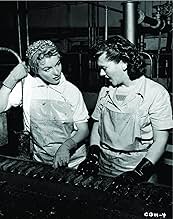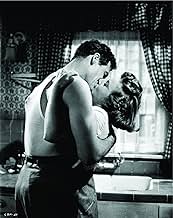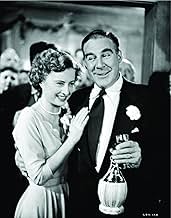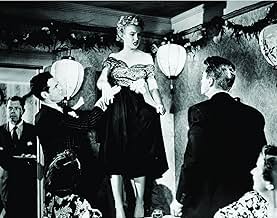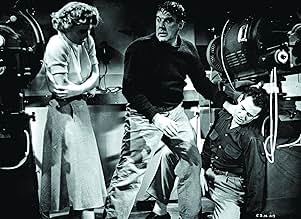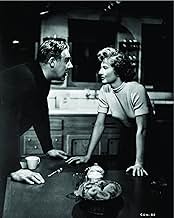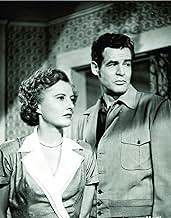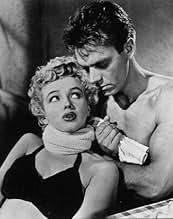IMDb रेटिंग
7.0/10
7.9 हज़ार
आपकी रेटिंग
अपनी भाषा में प्लॉट जोड़ेंMae Doyle comes back to her hometown a cynical woman. Her brother Joe fears that his love, fish cannery worker Peggy, may wind up like Mae. Mae marries Jerry and has a baby; she is happy but... सभी पढ़ेंMae Doyle comes back to her hometown a cynical woman. Her brother Joe fears that his love, fish cannery worker Peggy, may wind up like Mae. Mae marries Jerry and has a baby; she is happy but restless, drawn to Jerry's friend Earl.Mae Doyle comes back to her hometown a cynical woman. Her brother Joe fears that his love, fish cannery worker Peggy, may wind up like Mae. Mae marries Jerry and has a baby; she is happy but restless, drawn to Jerry's friend Earl.
- पुरस्कार
- कुल 3 जीत
William Bailey
- Waiter
- (बिना क्रेडिट के)
Harry Baum
- Restaurant Patron
- (बिना क्रेडिट के)
Dan Bernaducci
- Guest
- (बिना क्रेडिट के)
Albert Cavens
- Restaurant Patron
- (बिना क्रेडिट के)
Dick Cherney
- Fisherman
- (बिना क्रेडिट के)
Charles Cirillo
- Restaurant Patron
- (बिना क्रेडिट के)
Irene Crosby
- Guest
- (बिना क्रेडिट के)
Russell Custer
- Fisherman
- (बिना क्रेडिट के)
Tony Dante
- Fisherman
- (बिना क्रेडिट के)
Roy Darmour
- Man
- (बिना क्रेडिट के)
फ़ीचर्ड समीक्षाएं
A hardened woman returns home to a fishing village only to be caught between two men.
At least the movie has Andes and Monroe whose characters come across as refreshingly natural, along with revealing stock footage of the fishing industry. However, the rest of the film is pitched about ten decibels over the top, with all the subtlety of a hammer blow. Douglas's Jerry is not just a nice guy, he's a rub-your-nose-in-it Nice Guy. Similarly for Ryan's cynical Earl and Stanwyck's hard case Mae. Not even such first-rate performers as these can overcome the relentlessly overblown dialog or stagy sets. Nor does it appear the three were allowed to shade their performances beyond one-dimensional caricature. At the same time, the symbolism of roiling seas and surging tide is about as necessary as gravy on soup. In short, the movie amounts to a textbook exercise of heavy-handed histrionics and too much talk, Fritz Lang or no Fritz Lang.
I expect other reviewers are right about the material being shaped for 1950's audiences. In those days, one way of getting people away from TV was to promise them titillation since there was none on TV. But then producers faced the problem of Production Code limits on what could be shown or said on screen, especially in the way of sex. Thus, the emphasis in the film is on the atmospherics of desire instead of anything more literal. This results in a movie that, unfortunately, drowns in an overlay of heavy breathing, standard innuendo, and redundant symbolism. Such may have titillated audiences then; now there's just a dreary sameness in the repetition. At the same time, that turnaround ending shouldn't be overlooked. Unhappily, it's of the same Code-compromised sort that damaged more 50's movies than just this one.
I guess my biggest regret is how the movie takes three of Hollywood's most capable actors and reduces them to near-caricature of their usual screen persona, Douglas and Ryan, especially. Here's hoping they were at least well paid.
At least the movie has Andes and Monroe whose characters come across as refreshingly natural, along with revealing stock footage of the fishing industry. However, the rest of the film is pitched about ten decibels over the top, with all the subtlety of a hammer blow. Douglas's Jerry is not just a nice guy, he's a rub-your-nose-in-it Nice Guy. Similarly for Ryan's cynical Earl and Stanwyck's hard case Mae. Not even such first-rate performers as these can overcome the relentlessly overblown dialog or stagy sets. Nor does it appear the three were allowed to shade their performances beyond one-dimensional caricature. At the same time, the symbolism of roiling seas and surging tide is about as necessary as gravy on soup. In short, the movie amounts to a textbook exercise of heavy-handed histrionics and too much talk, Fritz Lang or no Fritz Lang.
I expect other reviewers are right about the material being shaped for 1950's audiences. In those days, one way of getting people away from TV was to promise them titillation since there was none on TV. But then producers faced the problem of Production Code limits on what could be shown or said on screen, especially in the way of sex. Thus, the emphasis in the film is on the atmospherics of desire instead of anything more literal. This results in a movie that, unfortunately, drowns in an overlay of heavy breathing, standard innuendo, and redundant symbolism. Such may have titillated audiences then; now there's just a dreary sameness in the repetition. At the same time, that turnaround ending shouldn't be overlooked. Unhappily, it's of the same Code-compromised sort that damaged more 50's movies than just this one.
I guess my biggest regret is how the movie takes three of Hollywood's most capable actors and reduces them to near-caricature of their usual screen persona, Douglas and Ryan, especially. Here's hoping they were at least well paid.
Far from vintage Fritz Lang, but still enjoyable in its high-strung melodramatic antics, accentuated in a needlessly symbolic way by the raging of the sea and the clouding over of the sky.
Tough girl Barbara Stanwyck returns to her hometown after ten years of being the mistress of a married man. "Home is where you come, when you run out of places", she says, characteristically". She meets and marries simple, goodhearted fisherman Paul Douglas, but is bored by ordinary married life: "Every day you get a little older, lonelier, stupider", and soon succumbs to her attraction to cynical, boozy movie projectionist Robert Ryan.
The power of 'Clash by Night' lies not in its trite plot or in its overblown imagery, but in the no-nonsense acting of Stanwyck and Ryan, tough as nails but raw at the core. They have an animal eroticism together between them that sparkles like fireworks, but they are also, alas, quite self-pitying.
Many of the bit parts are surprisingly unsavory, but then we also get the young Marilyn Monroe as the naive young girl who hopes to marry Stanwyck's hunky brother, played by Keith Andes, more often than not strutting his naked torso.
Tough girl Barbara Stanwyck returns to her hometown after ten years of being the mistress of a married man. "Home is where you come, when you run out of places", she says, characteristically". She meets and marries simple, goodhearted fisherman Paul Douglas, but is bored by ordinary married life: "Every day you get a little older, lonelier, stupider", and soon succumbs to her attraction to cynical, boozy movie projectionist Robert Ryan.
The power of 'Clash by Night' lies not in its trite plot or in its overblown imagery, but in the no-nonsense acting of Stanwyck and Ryan, tough as nails but raw at the core. They have an animal eroticism together between them that sparkles like fireworks, but they are also, alas, quite self-pitying.
Many of the bit parts are surprisingly unsavory, but then we also get the young Marilyn Monroe as the naive young girl who hopes to marry Stanwyck's hunky brother, played by Keith Andes, more often than not strutting his naked torso.
CLASH BY NIGHT is a melodrama that betrays its stageplay origins with some artful but sometimes arty dialogue that attempts to get us beneath the skin of its three main characters--and occasionally does. But it's a tribute to the acting skill of Stanwyck, Paul Douglas and Robert Ryan that their characters come alive with all their flaws and longings exposed.
Barbara is excellent as a woman who returns to a fishing village after a long time away, a bitter, defeated woman still trying to find a niche for herself. Paul Douglas does a remarkably fine job as a good-hearted man, simplistic in nature, who latches onto her only to have her betray him with the lusty Robert Ryan. Lookers on include two very interesting performers--Keith Andes and Marilyn Monroe (on her way up). Andes breathes life into the role of Barbara's disgruntled brother and should have been groomed for stardom--he had the looks and appeal of a major star.
A somewhat downbeat ending resolves the conflict--but along the way there are some very high-strung moments from Stanwyck that she plays to perfection. Marilyn Monroe demonstrates talent in a minor role.
A bit talky and stagebound in some scenes--but an interesting melodrama thanks mainly to the gripping performances of Stanwyck, Douglas and Ryan. Ryan would have made a great Stanley Kowalski in 'Streetcar' based on his drunk scene in this one. He can play a brute about as well as anyone and here he's quite an actor, matching Stanwyck's intense performance with a sturdy one of his own.
Barbara is excellent as a woman who returns to a fishing village after a long time away, a bitter, defeated woman still trying to find a niche for herself. Paul Douglas does a remarkably fine job as a good-hearted man, simplistic in nature, who latches onto her only to have her betray him with the lusty Robert Ryan. Lookers on include two very interesting performers--Keith Andes and Marilyn Monroe (on her way up). Andes breathes life into the role of Barbara's disgruntled brother and should have been groomed for stardom--he had the looks and appeal of a major star.
A somewhat downbeat ending resolves the conflict--but along the way there are some very high-strung moments from Stanwyck that she plays to perfection. Marilyn Monroe demonstrates talent in a minor role.
A bit talky and stagebound in some scenes--but an interesting melodrama thanks mainly to the gripping performances of Stanwyck, Douglas and Ryan. Ryan would have made a great Stanley Kowalski in 'Streetcar' based on his drunk scene in this one. He can play a brute about as well as anyone and here he's quite an actor, matching Stanwyck's intense performance with a sturdy one of his own.
Barbara Stanwyck, Paul Douglas, Robert Ryan, Marilyn Monroe, and Keith Andes star in "Clash by Night," based on the play by Clifford Odets that flopped on Broadway. It gets the full-blown treatment on the screen, with Fritz Lang directing and a strong group of actors.
Stanwyck is a world-weary woman who comes back to her roots because "home is where you go when you run out of places," and immediately attracts male attention from both Ryan and Paul Douglas. She's instantly attracted to Ryan, and each recognizes in the other an edginess and need for excitement.
To fight these urges, which haven't brought her any joy in the past, she marries Douglas, a simple fisherman who is deeply in love with her. It's not long before she gets antsy.
The acting is terrific, but the emotions are very big - possibly too big for the screen and more suited to the stage. Though everyone is excellent, Douglas has the sympathetic role and breaks your heart as the cuckolded husband.
Ryan is great as a volcano waiting to erupt, and Stanwyck's portrayal is ferociously honest and layered. She was 45 at the time of thee filming and obviously playing someone a good 10 years younger, but it still works.
Marilyn Monroe has a supporting role playing the girlfriend of handsome Keith Andes. He mainly shows off his physique, though he was actually a good actor who had success in TV and was also a powerful singer, playing opposite Lucille Ball on Broadway in "Wildcat."
Monroe, mostly in jeans and with a swimsuit scene, is beautiful and her acting is very natural. Later on in her career, she overpronounced her words, which worked well in comedy but less so in drama.
This is a very good movie with vigorous direction by Lang. There's just not much about it that's subtle.
Stanwyck is a world-weary woman who comes back to her roots because "home is where you go when you run out of places," and immediately attracts male attention from both Ryan and Paul Douglas. She's instantly attracted to Ryan, and each recognizes in the other an edginess and need for excitement.
To fight these urges, which haven't brought her any joy in the past, she marries Douglas, a simple fisherman who is deeply in love with her. It's not long before she gets antsy.
The acting is terrific, but the emotions are very big - possibly too big for the screen and more suited to the stage. Though everyone is excellent, Douglas has the sympathetic role and breaks your heart as the cuckolded husband.
Ryan is great as a volcano waiting to erupt, and Stanwyck's portrayal is ferociously honest and layered. She was 45 at the time of thee filming and obviously playing someone a good 10 years younger, but it still works.
Marilyn Monroe has a supporting role playing the girlfriend of handsome Keith Andes. He mainly shows off his physique, though he was actually a good actor who had success in TV and was also a powerful singer, playing opposite Lucille Ball on Broadway in "Wildcat."
Monroe, mostly in jeans and with a swimsuit scene, is beautiful and her acting is very natural. Later on in her career, she overpronounced her words, which worked well in comedy but less so in drama.
This is a very good movie with vigorous direction by Lang. There's just not much about it that's subtle.
The bitter and cynical Mae Doyle (Barbara Stanwyck) returns to the fishing village where she was raised after deceptive loves and life in New York. She meets her brother, the fisherman Joe Doyle (Keith Andes), and he lodges her in his home. Mae is courted by Jerry D'Amato (Paul Douglas), a good and naive man that owns the boat where Joe works, and he introduces his brutal friend Earl Pfeiffer (Robert Ryan), who works as theater's projectionist and is cheated by his wife. She does not like Earl and his jokes, but Jerry considers him his friend and they frequently see each other. Mae decides to accept the proposal of Jerry and they get married and one year later they have a baby girl. When the wife of Earl leaves him, he becomes depressed and Mae, who is bored with her loveless marriage, has an affair with him.
"Clash by Night" is an unpleasant drama with a bitter story and a moralist conclusion, actually a minor film of Master Fritz Lang in his career in Hollywood. Barbara Stanwyck has another magnificent performance in the role of a woman hardened by her bad sentimental and life experiences in the big city that returns home due to the lack of option. There is one quote ("When you run out of places, home is all you have left") that defines her mood. Paul Douglas plays a good honest man that nurses his old father, helps his crook alcoholic uncle and accepts the past of Mae Doyle, giving her a second chance. Robert Ryan plays a despicable rude man and disloyal friend. The affair between Mae and Earl has no chemistry and is only sexual desire. Last but not the least, it is delightful to see Marilyn Monroe playing a silly character. My vote is seven.
Title (Brazil: "Só a Mulher Peca" ("Only the Woman Sins")
"Clash by Night" is an unpleasant drama with a bitter story and a moralist conclusion, actually a minor film of Master Fritz Lang in his career in Hollywood. Barbara Stanwyck has another magnificent performance in the role of a woman hardened by her bad sentimental and life experiences in the big city that returns home due to the lack of option. There is one quote ("When you run out of places, home is all you have left") that defines her mood. Paul Douglas plays a good honest man that nurses his old father, helps his crook alcoholic uncle and accepts the past of Mae Doyle, giving her a second chance. Robert Ryan plays a despicable rude man and disloyal friend. The affair between Mae and Earl has no chemistry and is only sexual desire. Last but not the least, it is delightful to see Marilyn Monroe playing a silly character. My vote is seven.
Title (Brazil: "Só a Mulher Peca" ("Only the Woman Sins")
क्या आपको पता है
- ट्रिवियाThis movie was shot while Barbara Stanwyck was in the process of divorcing Robert Taylor. The movie also features the rising young star Marilyn Monroe. Barbara gives a good performance in one of her most memorable films. Despite her emotional devastation due to the divorce, the crew noted Stanwyck's lack of a diva tantrum. Fritz Lang later said, "She's fantastic, unbelievable, and I liked her tremendously. When Marilyn missed her lines - which she did constantly - Barbara never said a word."
- गूफ़While at the tavern, Mae and Jerry watch the moon rise over the ocean. The film takes place in Monterey, California, which is on the West coast, where the moon rises over the hills and sets on the ocean.
- क्रेज़ी क्रेडिटand introducing Keith Andes
- कनेक्शनEdited into Les Amoureux du cinéma (1987)
- साउंडट्रैकI Hear a Rhapsody
Written by George Fragos (uncredited), Jack Baker (uncredited) and Dick Gasparre (uncredited)
Sung by Tony Martin
टॉप पसंद
रेटिंग देने के लिए साइन-इन करें और वैयक्तिकृत सुझावों के लिए वॉचलिस्ट करें
- How long is Clash by Night?Alexa द्वारा संचालित
विवरण
बॉक्स ऑफ़िस
- दुनिया भर में सकल
- $62
- चलने की अवधि1 घंटा 45 मिनट
- रंग
- पक्ष अनुपात
- 1.37 : 1
इस पेज में योगदान दें
किसी बदलाव का सुझाव दें या अनुपलब्ध कॉन्टेंट जोड़ें



